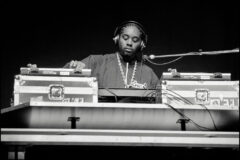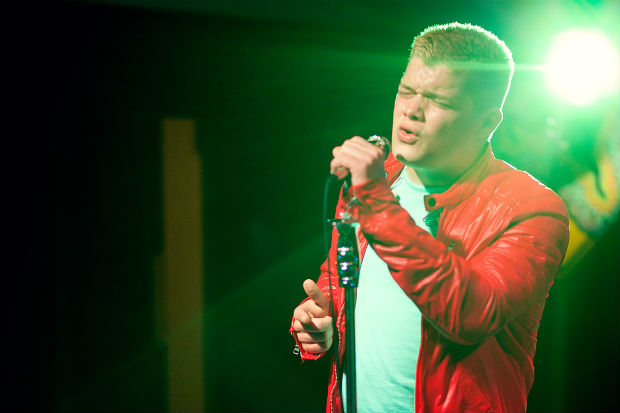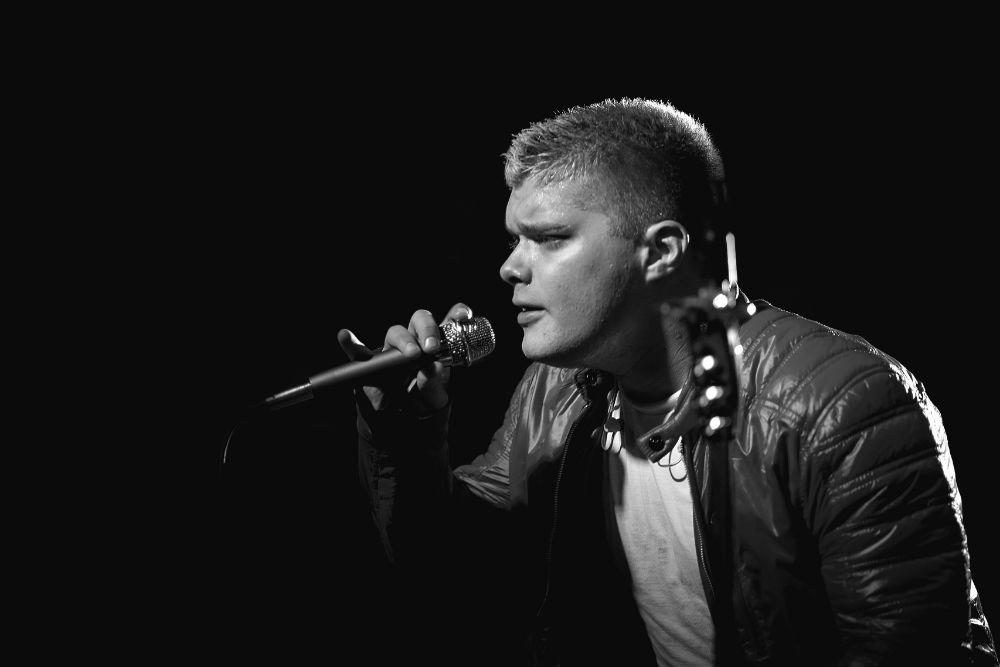It’s quarter past 9:00 p.m. on the first Friday of February, and Scott Isbell is ten minutes into a 15-minute set at a small Emerson College venue. After his second song — a cover of reggae-fusion artist Michael Franti’s “Oh My God” — Isbell, 22, introduces himself to the 30-plus undergrads in the audience. He includes all the vitals for a college orientation (“I’m a first semester senior here at Emerson. I’m a marketing and communication major. When I’m not working on music, I’m either working out or watching Law & Order SVU or Pawn Stars.”) but leaves out the most pressing bit of information: Over the course of the past month, Isbell’s latest release, a rapped pop track called “Trumpified,” has gone viral, reaching 31 million SoundCloud listens; it’s been among the top-ten most-listened-to songs on the service since January 18.
On this campus, Isbell’s fame predates “Trumpified,” and his introduction is unnecessary. Much of this “hipster crowd” — how Isbell would refer to them throughout the night — came for him. They chant “Ba-by Boy!” (a name inspired by his steely eyes) with the exuberance typically reserved for adored athletes.
Because of the mainstream nature of Isbell’s success, the incongruence between this vintage-clad, mosh-happy audience and the clean-cut performer on stage makes the fervor unsettling. To an outsider, it’s reminiscent of the opening round of American Idol auditions — that palpable guilt and culpability that would settle in the stomach when the show would televise some disillusioned singer, equally devoid of talent and self-awareness.
To be fair, Scott Isbell, though not altogether self-aware, does possess talent. He has a smooth, melodic voice, captivating stage presence, and a knack for making songs that will stick in your head; he’s the type of artist who would likely do quite well on American Idol. The reason this crowd’s applause felt facetious, well, it’s there in Isbell’s SoundCloud bio: “Where eyes may be the window to a person’s soul, the piercing blue eyes of the young Scott Isbell are the window to a new kind of Soul that pushes the boundaries of modern Pop music to heights of past legends. A proven and passionate performer, Isbell crosses seamlessly from studio to stage to screen, evoking the presence of the Kings of Pop and Soul.”

Also Read
GEAR THAT MADE THE GAME: Rap Machinery
That bio, written by Isbell and a hired PR hand, is sincere. And so are his frosted tips, his turquoise rolly backpack, the Pan posters (yes, multiple) hanging in his dorm room, and his chain. Scott Isbell is a cornball. He’s chameleonic in his music and his presentation, rapping with Wu-Tang affiliate Cappadonna one moment, looking like a teen J.C. Penney model the next. But the common threads between his singles are teen-pop sap and schlock; when he croons it’s reminiscent of a DIY Aaron Carter. (In his 2015 SoundCloud single, “Fall in Love Again,” he sings, “It’s obvious we belong together / Me and you are going to last forever / You turn my frown right upside down.”) These are the qualities that inspire certain factions of the Internet to write nasty comments — “I enthusiastically hope you end up on a campaign flight with Trump and the plane goes down in flames,” writes one unsatisfied consumer — but the earnestness with which he conveys them is what makes him endearing to others.
For instance, Emerson senior Rachel O’Brien, who calls herself Isbell’s “biggest fan” and aspires to be a Cher impersonator, says that seeing him live is “a transcendental experience.” When I ask if her love is ironic she acts like she hadn’t even considered that as an option. “Maybe other people think about [Isbell ironically], but to me it’s totally earnest. Like, I cannot convey to you how much I love [Isbell’s single] ‘Hollywood Dreams.’ And just his website and everything, it’s 100 percent earnest. I think he has a very positive vibe, and I think we should cherish that.”
The guys at the show, many of whom were Isbell’s loudest supporters, spoke in equal superlatives, while denying that the attraction was ironic. “There’s like a thing inside him,” says Federico Slezynger, an Emerson junior. “He’s got that aura. There’s like a whole-hearted chi, like he was chosen by like a higher power.”
As Isbell concludes his set, his chi is in full force. He ends with “Let the Music Get You High,” which he says is “about when people are douchebags or they have something nasty to say… The thing is, you just gotta feel the music, block out the bulls**t in life.” During the song, he wraps an Elvis-inspired white scarf, monogrammed with his initials, around the respective necks of two lucky coeds, and gives each a kiss on the cheek. The girls at the show scream as if it’s 1957 and Isbell is the King himself. The performance is a little embarrassing, but mostly it’s adorable.
After the song, the crowd chants for an encore. They want to hear “Trumpified.” Isbell declines. “I’d rather just knock ‘em out dead with a shorter set and then just get off,” he explains after the show. “That’s what Jimmy’s always taught me to do.”

Jimmy is Jimmy Kang, the Vice President of Wu-Tang Management. Back around 2009, when Isbell was attending Worcester Academy — a prep school close to his home in Acton, Massachusetts — he began performing at open-mic nights at Kang’s then-club, Red 1888. The cherubic Isbell was a change of pace from the club’s typical underground hip-hop fare, but girls liked his music, and the pair soon became friends, with Kang taking on a mentoring role. “I slowly got him introduced to everyone in a Wu-Tang cipher, and then gradually started pushing him,” Kang says over the phone. “I think Raekwon had done a song with Justin Bieber back in the day. So with that in mind, Scott reminded me of a pop artist. And I’m introducing him to all these different legends in hip-hop, and Scott’s oblivious. He didn’t really know who they are. So he’s very cool with them, not starstruck or anything.”
Kang signed Isbell in 2013, making him the management group’s first pop artist. Soon thereafter Kang started wondering what had taken him so long to venture into mainstream music. “I thought, ‘Wow, this pop game is actually easier than the hip-hop game.’ Because with the hip-hop game, you got the rough-necks. You know, everyone wants to be hood and gangster and everything. Pop is more, ‘Hey, let’s get this stunt together, and let’s make this happen.’”
Though Kang intended for Isbell to stick to pop music, at the start he would give him gigs opening for various Wu-Tang members’ shows; at various points Isbell shared the stage with such rappers as Busta Rhymes and Sean Price. “It started at first where I had no following,” says Isbell. “But when someone goes to see a Wu-Tang Clan show and all of a sudden there’s a white kid on stage singing, they’re going to check you out online. They’re going to start following you. And if anything, Wu-Tang fans a lot of the time will be like, ‘Oh, you’re perfect for my daughter to listen to.’ And so that’s how some fans get to know me.”
From there, Isbell’s following grew gradually but significantly (he’s a tenacious networker and a skilled online self-promoter) and by 2015, after performing at SXSW, Isbell had gained hundreds of thousands of Twitter followers. But it wasn’t until “Trumpified” that Isbell went viral, no longer just an Emerson cult obsession.
Though the song was released in December, its inception dates back to June, when Donald Trump announced his presidential bid. Isbell and Kang batted song ideas back and forth. “It was a marketing plan. Because we knew Trump was going to run for president and he was going to make a lot of noise. So we piggy-backed off that,” says Kang.
Isbell had been working on a song called “Funkified,” about the experience of seeing Earth Wind & Fire perform, and then, while watching a Trump speech in his dorm, it clicked. Trumpified. “I wanted to write about Donald Trump because whenever anyone wakes up in the morning, he comes into their mind — regardless of if you love him or hate him. So to me, everyone in this country is Trumpified right now. Because even if they hate him, he’s on their minds nonstop.”
Count Isbell among that group. He thinks Trump would make a fine president because “he’s exciting and entertaining” and “knows how to build an incredible narrative.” (Isbell also thinks that the wall is not such a bad idea, and that if anyone could build one it’s Trump because “he hustles hard.”) But the song was never meant to be political. Isbell only intended for it to capture — and piggy-back off of — Trump’s momentum. “I wanted to write a song that was so bizarre and in its own lane that people can’t tell what is on my mind,” he says.
In that, he succeeded. The song begins with a few wistful notes from a keyboard — which, you know, is naturally a great prelude for a layer of air horns. Isbell hates air horns. He added them because “even if the crowd is like, ‘Damn, I hate pop music. I don’t even think this kid can sing,’ that air horn goes off and it gets your attention.’” Then, a minute into the song — after Isbell sings about how Trump’s “going to make our dreams right before our eyes” — he starts rapping about his experience with ADHD, which is totally unrelated, but then again, it’s sort of the perfect symbol for America’s relationship to the 2016 presidential election.
Though “Trumpified” is not the only song about Trump, Isbell and Kang attribute its success to it being released at the right time, about the right subject. The track is no doubt catchy and loathsome enough to make it a sensation. And yet, aspects of its success remain boggling. How did it seemingly become the seventh most-listened-to song on SoundCloud overnight?
Kang, Isbell, and Amar Divine (who works on social media for Wu-Tang Management) all deny purchasing bots to juice the song’s numbers, but an alarming number of the earliest commenters on “Trumpified” have the same profile, save for the name and photo. (Many of these profiles were deleted after I tried messaging them.) They follow the same 39 artists and have listened to the same 18 tracks, 11 of which are by Isbell.
Ultimately, whether the numbers for “Trumpified” are legitimate is largely inconsequential. Isbell has achieved some modicum of Internet fame, and must now elude the pitfalls of virality. “I don’t want to just be known as that Trump kid,” he says after the Emerson show. Kang hopes to push Isbell, who once starred on a children’s show about marine biology, towards Disney. “I know he could be a full-on Disney star,” Kang says. “He knows how to act. He’s a clean-cut white boy — blue eyes, white hair. All-American boy who plays ice hockey. And he looks very young. What else could you ask for?’”
It’s not hard to imagine Isbell on a Disney Channel show — maybe a fish-out-of-water story about a white kid who stumbles into hip-hop clubs and befriends the owner? But Isbell should (and, I think, does) realize that he doesn’t need networks or labels. If he evolves while remaining unapologetically schmaltzy, then the Internet is his oyster. It’s why his classmates are so infatuated with him: It can be refreshing for an artist to balk at musical precision and artistic experimentation, in favor of emotional evocation. (“I hate music theory and never use it,” Isbell says in one of our first conversations. “I create 16-part harmonies, no problem, just with my ear. I would rather study how to market myself and win.”)
What exactly “winning” means for Isbell is fairly nebulous. Like the way Trump uses the term, it can be all-encompassing for Isbell. He wants commercial success; he wants to start a PR company; he hopes to one day tap into America’s nostalgia and manage a boy band; and he wants to “change the game where it’s about the music again.” Never mind how bizarre that last bit is coming from someone whose claim to fame is a song about the Donald. Never mind that these goals are at odds with one another, and perhaps overly ambitious. Isbell doesn’t see it that way. “Did you hear the crowd when the air horns went off?” he asks me after the show. “They go nuts. It’s obnoxious. But I’m kind of twisted. I like to do things in life that sometimes I find funny, but maybe other people don’t get.”
Yeah, he’s certifiably Trumpified.




